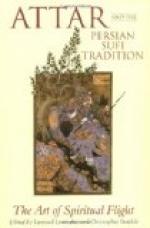|
This section contains 394 words (approx. 2 pages at 300 words per page) |
Encyclopedia of World Biography on Farid ed-Din Attar
Farid ed-Din Attar (ca. 1140-ca. 1234) was a Persian poet and Sufi mystic. Living during a turbulent era of political uncertainty, he turned inward, exploring the realm of God and paths to Him through mystical poetry.
Little about Attar is known with certainty. His name (literally, perfume of roses) indicates that, like his father, he was a druggist and followed the calling of a medical man. Supposedly reliable Persian sources vary in the year of his death by a span of 43 years. One reason for this obscurity is that, unlike other Islamic poets, he did not write flattering panegyrics about his own life and greatness. This is to his personal credit but unfortunate for the historian. We are certain only of the fact that he was born in Nishapur in northeastern Persia; he passed 13 years of his youth in Mashad and spent much of his life collecting the poetry of other Sufi mystics.
Attar wrote over 114 books on Sufism. According to his own writings, Sufism was meant to be a spiritual search for a union with God. This search throughout history has taken many forms, but for Attar it was quite specific. Parallels may be seen with Dante. According to Attar, the spiritual pilgrimage of man brings him through seven successive "valleys." First is the valley of quest, where ascetic means are adopted; then follows the valley of love, which may be compared to Dante's earthly paradise; then follow the valleys of knowledge, detachment, unity, and amazement; and finally the valley of annihilation of the self is reached. This is the supreme state of divine union with God. Sufism was meant to be an all encompassing effort to live in a meaningful religious frame of mind.
The two best-known works of Attar are Tadhkirat al-Awliya (Memoirs of Saints), a prose work, and Mantik al-Tayr (Conference of the Birds). In Conference all the birds in the world are seeking God, who is called Simurgh. After a long search all but 30 birds perish. When they arrive at their destination, they realize that Simurgh (in Persian the word means 30 birds) is really themselves.
Attar died fleeing the Mongol hordes under Genghis Khan. Just before his death, Attar met a young poet, Rumi, to whom he gave some of his philosophical poems. Rumi perpetuated and added to the philosophical development of Sufism and the understanding of Attar.
|
This section contains 394 words (approx. 2 pages at 300 words per page) |


